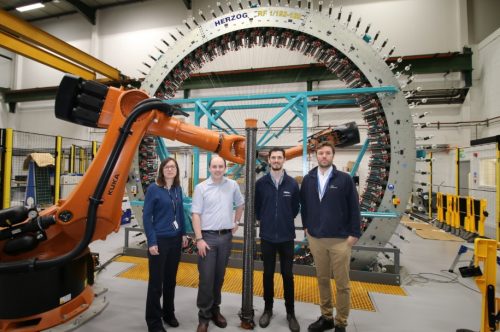£20m collaboration set to help UK aviation industry take flight

Researchers at the University of Sheffield Advanced Manufacturing Research Centre (AMRC) are part of a £20m project to develop light-weight propeller blades to help the UK aviation sector reduce its carbon footprint and airport noise emissions.
Part of an industry-led consortium with two other members of the High Value Manufacturing Catapult.
The AMRC, along with the National Composites Centre in Bristol and the Manufacturing Technology Centre in Coventry, is supporting private sector partner Dowty Propellers (part of GE Aviation Systems) for the Innovate UK funded Digital Propulsion project.
The consortium is tasked with growing the UK’s aerospace propeller manufacturing base by harnessing composite technology with industrial digitalisation. This cuts production costs and increases the performance of future propulsion systems in Europe’s €200bn aviation sector.
Elaine Arnold, automation technical lead for the AMRC Composite Centre, said: “In a world of increasing passenger numbers the demand for cleaner, cheaper and yet more comfortable air travel has never been greater. To meet this demand, it is vital the UK maintains and extends its world leading capability in sustainable UK aviation propulsion technologies.
“The Digital Propulsion project aims to evolve technologies within a new digital infrastructure to realise innovations in propulsion performance and cost.
“Part of the role of AMRC is to explore novel and innovative ways to design and manufacture varying types of propeller blades, from regional to small, including the load bearing structure, the cores, the blade roots and relevant hub connections. This is being carried out alongside the National Composites Centre (NCC) who will be exploring the use of their specific manufacturing and design technologies.
“Engineers have been coming up to Sheffield and us down to Bristol which means a cross pollination of ideas and for everyone to see that we are better working together.”
She said the work being done by engineers at the AMRC draws on the capabilities offered by state-of-the-art equipment recently purchased by the AMRC with funding from the Aerospace Technology Institute (ATI).
She said: “Our portfolio of cutting edge equipment means we’re able to access a wide range of advanced technologies to do this work including finite element analysis, braiding, tailored fibre placement, resin transfer moulding and press forming.
“It is very much a collaborative piece of work and a great example of why collaboration across the High Value Manufacturing Catapult centres is of tremendous benefit to industry; engineers from the AMRC and NCC are exchanging their understanding and knowledge of capabilities to find and develop innovative manufacturing methods that will not only reduce costs but increase performance, positioning the UK as a world leader in this field.
“Dowty has flown the flag for the British aerospace industry across the world for many years, and this project will ensure it continues to do so into the future. For the AMRC, the outputs of the programme will be a proven cost-effective route to manufacture composite blades and a springboard for further research and development.”
Jonathan Chestney, Dowty Propellers’ Engineering Leader, said: “This programme paves the way for new business opportunities within Dowty. The technology development led by the Catapults is allowing us to explore both current and emerging markets and create offerings for prospective customers which are both innovative and cost effective.
“The cross-Catapult collaborative effort is enabling detailed technology development to occur at a fast pace due to the sharing of resource and expertise, all of which benefits Dowty and, ultimately, its customers.”






